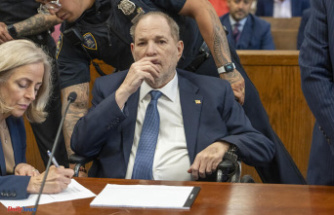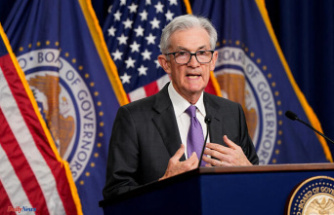It is a wake-up call from the municipalities: the head of the district council warns that there is a risk of an "overwhelming trap". Not only when it comes to taking in refugees, nothing will soon be possible. The country must take countermeasures.
Fellbach (dpa / lsw) - After massive pressure from the municipalities, Prime Minister Winfried Kretschmann announced a refugee summit in Baden-Württemberg. The Greens politician said on Monday at the district assembly in Fellbach (Rems-Murr-Kreis ) on. Then he will invite to a "summit" with the municipalities. The president of the district council, Joachim Walter, had previously warned that the influx of refugees had to be slowed down. Because the recording capacities are almost exhausted and acceptance among the population is noticeably decreasing.
Walter sees false social incentives for Ukrainians who have already found safe accommodation in other EU countries such as Poland or Spain. "This uncontrolled secondary migration must indeed be stopped," said the Tübingen district administrator in front of around 300 listeners in Fellbach. The federal government must reverse the so-called legal change for Ukrainian refugees. Walter called on the state to take a corresponding Federal Council initiative.
Since June 1, Ukrainians have received Hartz IV and, thanks to the change in legal status, can also rent their own apartment and take up work. That has a strong attraction, explained the association president. The CDU politician warned that other asylum seekers must be prevented from benefiting from these social services. Walter also called on the state to assume all the costs of the municipalities for taking in and caring for the refugees.
Kretschmann said that Baden-Württemberg had not campaigned for the change of legal regime. But it is hopeless to demand in the Federal Council that this be reversed. "You have to accept that." The head of government complained that the federal government had not yet fulfilled its promise from March to contribute to the costs of taking in Ukrainian refugees.
Baden-Württemberg has already taken in one and a half times as many refugees as in the 2015 migration crisis. According to the Migration Ministry, over 134,000 refugees from Ukraine have been registered in Baden-Württemberg to date. In addition, there are over 19,000 asylum seekers who will remain in the country and another 2,800 refugees from humanitarian admission programs. That's a total of about 156,000 people. In 2015 around 101,000 asylum seekers were registered in the southwest.
Kretschmann criticized that the federal government had doubts about the country's current figures. "It's always the same scam to mess around with these numbers," criticized Kretschmann. He is counting on the Prime Ministers' Conference with Chancellor Olaf Scholz (SPD) also agreeing on this issue.
Walter said the municipalities were stuck in an “overwhelming trap”. Federal and state governments are constantly burdening cities, municipalities and districts with new tasks, legal rights and standards without providing sufficient funding. There is an urgent need for a debate in the country about what is priority and what is secondary. "Not everything that is desirable can also be achieved."
The head of the association called on Kretschmann to speak and decide at the highest level about reducing bureaucracy and the dismantling of standards. However, the ministries should not participate in the first step because they would only talk such proposals to pieces. "If you want to drain a swamp, don't ask the frogs." Walter proposed a working group from the state, finance and interior ministries with the municipalities.
As an example, Walter cited the legal entitlement to all-day care in elementary school from 2026. Everyone knew "that this was an impossibility". And yet the federal and state governments decided to do so, "because symbolic politics is now more important than drilling thick boards."
It is also unacceptable that the districts have to step in as a "guarantor" for the country in financing the hospitals. For the purchase of medical devices, the districts would now have to contribute 50 million euros. The country must also consider whether a "departure from a legally anchored mobility guarantee" is necessary. The guarantee is intended to significantly expand local public transport in rural areas.
Kretschmann was in principle ready for such a debate on reducing bureaucracy, but warned against expecting rapid success. "If you want to start lowering standards, you have to say where." And then the ministries would have to be involved immediately. "Of course, the specialist departments are the first address for such announcements." The problem is that many issues involve the federal government or even the European level. He promised to focus on reducing bureaucracy once the crisis had peaked. But Kretschmann also said that it was not the case "that the district offices were free of official mold".












